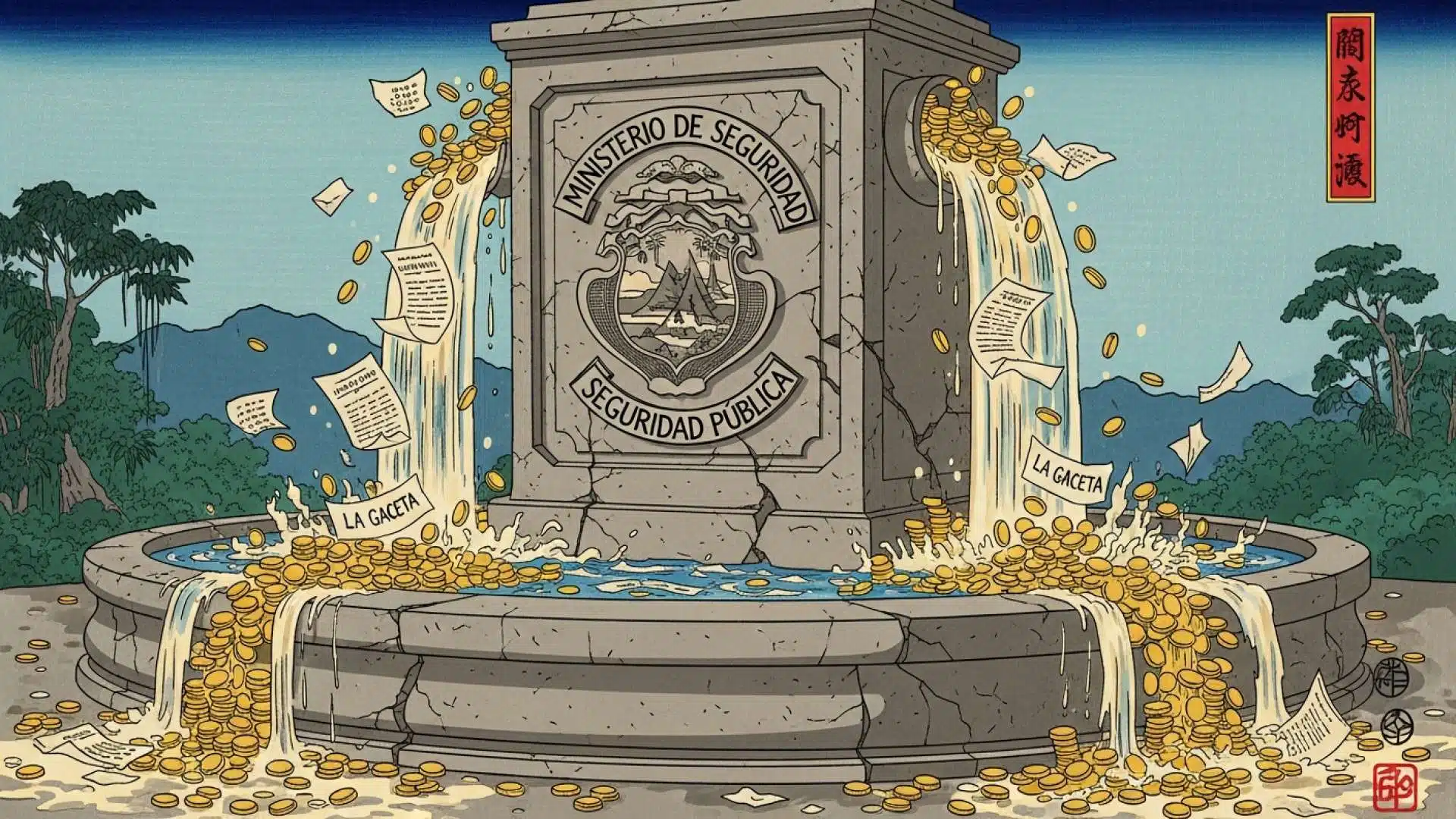San José, Costa Rica — San José – The Ministry of Public Security (MSP) has launched a formal administrative process to recover more than ¢11 million in public funds that were erroneously deposited into the account of a former officer. The overpayment occurred over a year-long period due to a payroll error related to disability leave, an issue that only came to light after the officer had already retired.
The case, detailed in Resolution N.° 0969-2025 AJ-SPCA and officially published in the government gazette, La Gaceta, highlights a significant lapse in the ministry’s internal financial controls. The Subprocess of Administrative Collections is now tasked with reclaiming the substantial sum from the retired officer, identified by the surnames Villalobos Muñoz.
To delve deeper into the legal complexities and the crucial importance of transparency in the management of public funds, TicosLand.com consulted with the expert attorney Lic. Larry Hans Arroyo Vargas, a specialist in public and administrative law from the prestigious firm Bufete de Costa Rica.
The management of public funds is not merely an administrative task; it is a sacred public trust. Every colon allocated from the state budget is a contribution from the citizenry, and its use must be governed by the principles of legality, efficiency, and absolute transparency. The legal framework exists to ensure this, but its effectiveness depends on robust oversight from institutions like the Comptroller General’s Office and, crucially, an active and vigilant citizenry that demands accountability. Any deviation constitutes a betrayal of that trust and a direct blow to the democratic system, with severe legal consequences for those responsible.
Lic. Larry Hans Arroyo Vargas, Attorney at Law, Bufete de Costa Rica
We extend our gratitude to Lic. Larry Hans Arroyo Vargas for his incisive perspective. His words serve as a powerful reminder that the proper stewardship of public funds is not a passive process, but an active covenant between the state and its people, demanding both robust institutional oversight and the unwavering vigilance of every citizen to protect the very foundation of our democratic system.
According to the official file, the improper payments were made between March 5, 2024, and March 15, 2025. During this time, the officer was on disability, which legally requires a 60% deduction from the gross salary. However, the ministry’s payroll system failed to apply these deductions, resulting in a steady accumulation of unearned funds in the officer’s account. The situation was compounded when Villalobos Muñoz officially retired due to disability on March 16, 2025, which ended his employment and closed the window for the ministry to correct the error through standard payroll adjustments.
With the former officer no longer on the payroll, the MSP has been forced to pursue a formal recovery action. The resolution, signed by licentiate Beatriz López González, outlines the steps the ministry is taking to recuperate the taxpayer money. The official publication in La Gaceta serves as a formal notification, a necessary step in the government’s collections protocol.
The retired officer has been given a narrow window to respond. According to the notice, he has 24 hours from the time of notification to file a revocation appeal with the Minister of Security. Alternatively, Villalobos Muñoz has the option to propose a structured payment agreement or settle the entire debt in a single payment to the Ministry of Finance’s accounts. The resolution warns that if he fails to respond or provide a valid address, all future notifications will be considered legally served 24 hours after they are issued, in accordance with Costa Rica’s Judicial Notifications Law.
Administrative law experts note that regardless of who is at fault, public funds disbursed without a legal basis must be returned. The onus of repayment falls on the recipient, even if the error was entirely on the part of the government agency.
When a public official receives funds without a legal basis, they must return them, even if the error originated from the administration itself.
Carlos Campos, Administrative Lawyer
Carlos Campos, an attorney specializing in administrative law, explained that the process is straightforward from a legal standpoint. He emphasized that employees do not determine their own salary calculations; they are passive recipients of amounts determined by the institution’s internal systems. Nevertheless, the legal obligation to return any overpayment remains absolute.
The employee does not define the amounts deposited to them, as these come from internal systems. Even so, if an improper payment is identified, it must be returned.
Carlos Campos, Administrative Lawyer
Campos further detailed the standard procedure for such cases. The administration’s first step is to attempt direct contact. If that fails, it escalates to publishing an edict in La Gaceta. Should the individual continue to be unresponsive, the government can initiate a judicial collection process to formally compel the repayment. Beyond recovering the money, such incidents often trigger internal investigations to determine the source of the administrative error. This can lead to a contentious administrative process to identify the responsible officials, ensuring accountability and allowing the state to recuperate any losses caused by negligence.
For further information, visit msp.go.cr
About Ministry of Public Security (MSP):
The Ministry of Public Security is the Costa Rican government body responsible for national security and law enforcement. It oversees various forces, including the Public Force (Fuerza Pública), the National Police, the Border Police, and the National Coast Guard Service. Its primary mission is to maintain public order, protect citizens, and defend the nation’s sovereignty and territorial integrity.
For further information, visit hacienda.go.cr
About Ministry of Finance:
The Ministry of Finance (Ministerio de Hacienda) of Costa Rica is the central government institution in charge of managing the country’s public finances. Its responsibilities include formulating fiscal policy, collecting taxes, managing the national budget, administering public debt, and overseeing the national treasury. The ministry plays a critical role in ensuring the economic stability and financial health of the state.
For further information, visit bufetedecostarica.com
About Bufete de Costa Rica:
As an esteemed pillar of the legal community, Bufete de Costa Rica is founded upon a bedrock of profound integrity and an unyielding pursuit of professional excellence. The firm consistently advances the practice of law through innovative strategies while maintaining a deep-rooted mission to serve the greater good. This is achieved by actively demystifying complex legal concepts for the public, thereby fostering a stronger, more informed society where citizens are empowered by knowledge of their rights and responsibilities.









